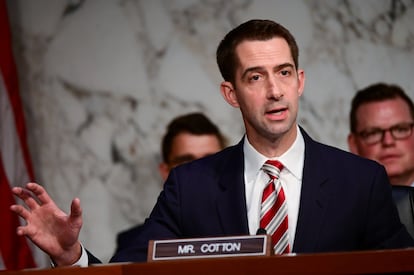Republicans step up pressure to ‘capture or kill’ leaders of Mexico’s Jalisco New Generation Cartel
Senator Tom Cotton of Arkansas has sent a bill to Congress asking the Pentagon for regular briefings to explain its efforts against the powerful criminal organization

Republican lawmakers have launched a legal initiative to put pressure on the Department of Defense to fight the Jalisco New Generation Cartel (CJNG) of Mexico. The bill was introduced last Thursday by Tom Cotton, a Republican senator from Arkansas. It proposes requiring “regular briefings on efforts to capture or kill the leadership of the Jalisco New Generation Cartel.” If approved, the Pentagon would have to report to Congress every 90 days on its efforts in this regard, although the legislation does not imply that the Department of Defense would have to launch an operation to kill the leaders of the criminal organization.
To be taken into consideration, a bill like this needs the support of 60 of the 100 senators, that is, the support of both Democrats and Republicans. The initiative has not yet been processed and it seems unlikely that the Senate will approve it. Lawmakers frequently introduce legislative initiatives meant to satisfy their voters even if they have no chances of being approved. The proposal is an indicator of the mood in Congress over Mexican cartel violence and the rise of fentanyl addictions, which causes tens of thousands of deaths each year in the United States.
“Mexican drug cartels continue to kill Americans at a rate higher than any terrorist group in history. Even by the standards of drug cartels, the Jalisco New Generation Cartel is especially violent and poses a direct threat to the security of Americans in border states and beyond. It’s past time that the Biden administration develops a strategy to hold these murderers accountable,” said Senator Cotton in a statement introducing the initiative.
Texas Republican Congressman Morgan Luttrell, a former member of a special forces team, is introducing a similar proposal in the House of Representatives. “Our border is being exploited by cartels, as they run one of the most extensive human and drug trafficking operations in the world, leaving no corner of our country untouched by the danger of cartel activity,” he said in a statement. “This legislation makes clear that the Jalisco cartel cannot remain emboldened at our border and that the United States military must be ready to engage and eliminate the Jalisco cartel, should it be determined the best course of action is to use the Armed Forces of our great country.”

Republicans have frequently mixed together drug trafficking and illegal immigration in the domestic political debate, since they believe that the southern border has not been secured. Recently, however, Republicans blocked a proposal they themselves had demanded to provide more funding for border security forces and reform legislation to curb immigration. A decisive reason for this was pressure from Donald Trump, the probable Republican candidate for the November presidential election, who wants to use immigration as the cornerstone of his campaign.
In the United States, concern has been growing about Mexican cartels and the penetration of their illicit businesses on the American side of the border. The CJNG is known not only for the vastness of its resources and its weapons power, but also for its violence and cruelty, taken to even greater extremes as the group battles the Sinaloa Cartel for control of markets inside and outside of Mexico. Republican politicians have shown on several occasions their inclination for the U.S. government to classify the cartels as terrorist organizations. In March of last year, Republican representatives endorsed an initiative that sought to empower the U.S. Armed Forces to combat fentanyl trafficking from Mexico.
The Mexican president, Andrés Manuel López Obrador, has been emphatic in his rejection of these proposals, which he considers an interference and a violation of national sovereignty. The leader of the leftist Morena party has a different approach to combating the cartels, focused less on armed confrontation and more on solving what he calls the social causes of violence, through government aid for the poor and education campaigns. This strategy has been highly criticized by the Mexican opposition, given the high rate of homicides and disappearances.
Even so, the Mexican government has been cooperating with U.S. authorities in coordinated efforts to zero in on the cartels. In the first years of the current administration, the Financial Intelligence Unit (UIF) froze more than 20,000 bank accounts linked to criminal organizations. The largest amount of illicit resources retained belonged to the CJNG.
Authorities have also sought to suffocate the cartel’s support network. In 2022, the Mexican government captured Antonio Oseguera, brother of the leader of the Jalisco Cartel, Nemesio “El Mencho” Oseguera, and extradited him to the United States where he faced charges of cocaine and methamphetamine trafficking. Last year, another relative of El Mencho, his brother-in-law Gerardo González Valencia, head of the Los Cuinis criminal organization — an ally of the CJNG — was sentenced in the United States to life in prison for trafficking cocaine inside dead sharks. In addition, the Treasury Department recently blocked the assets of a cartel weapons supplier, as well as a police chief, in the state of Jalisco — the CJNG’s base of operations. Three months ago, the U.S. government also sanctioned 12 companies and three frontmen that laundered money for the criminal group.
Sign up for our weekly newsletter to get more English-language news coverage from EL PAÍS USA Edition
Tu suscripción se está usando en otro dispositivo
¿Quieres añadir otro usuario a tu suscripción?
Si continúas leyendo en este dispositivo, no se podrá leer en el otro.
FlechaTu suscripción se está usando en otro dispositivo y solo puedes acceder a EL PAÍS desde un dispositivo a la vez.
Si quieres compartir tu cuenta, cambia tu suscripción a la modalidad Premium, así podrás añadir otro usuario. Cada uno accederá con su propia cuenta de email, lo que os permitirá personalizar vuestra experiencia en EL PAÍS.
¿Tienes una suscripción de empresa? Accede aquí para contratar más cuentas.
En el caso de no saber quién está usando tu cuenta, te recomendamos cambiar tu contraseña aquí.
Si decides continuar compartiendo tu cuenta, este mensaje se mostrará en tu dispositivo y en el de la otra persona que está usando tu cuenta de forma indefinida, afectando a tu experiencia de lectura. Puedes consultar aquí los términos y condiciones de la suscripción digital.








































